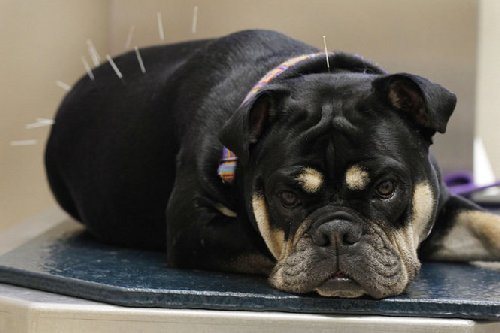
Inglewood, CA – One of those embarrassing conditions to both man and beast is “flatulence” or gas. When released at an inopportune time it can really upset the moment and is a good indicator of your pet’s health. All types of dog breeds can suffer from this condition too and that in turn affects us all.
The medical word for gas is flatus and the condition of passing gas is called flatulence. “A lot of my clients and friends prefer the classic word, ‘fart,’” Said Dr. Richard Palmguist, Chief of Integrative Health Services at Centinela Animal Hospital, in Inglewood California. “A famous comedian once said, ‘Farts are funny,’ which is true unless the noxious invisible smog is wiping out your dinner party or messing up your romantic interlude, then we need to do something to change the condition.”
Dr. Palmguist went on to say “When your pet eats they swallow air, which contains oxygen, nitrogen and other minor gasses. Most of the oxygen is rapidly absorbed through the intestinal wall and into the blood stream. This leaves the nitrogen. Bacteria that live in the intestine convert food into various substances and one of those is gas. It’s not the volume of gas that matters, though, it is the odor and that varies considerably.”
Your pet’s health can become compromised when their delicate digestive tract becomes out of balance and this can lead to the production of gas. What the animal ate and how their digestive systems work will determine how much of the noxious substances like hydrogen sulfide are produced.
Dr. Palmguist explains what causes our pets to stink:
- Dog foods that are high in wheat, corn, soy or other cereal grains may aggravate gas in sensitive dogs. Both high fiber and low fiber diets can make some pets worse.
- Food additives and preservatives can upset the delicate normal population of bacteria and fungi that assist in digestion.
- Excessive protein levels, eggs and dairy products in the diet can cause bacteria to convert excess nutrition to gas. Protein generated gas can be particularly smelly.
- Sudden changes in diet or excessive foods like beans, lentils, broccoli, cabbage or cauliflower.
- Prescription and over the counter drugs that negatively impact digestion and bowel function can lead to gas. Antibiotics, antidepressants, blood pressure drugs, narcotics, herbs and natural supplements can all trigger gas attacks.
- Intestinal parasites like Giardia are often associated with gas problems.
- Inflammatory bowel conditions lead to altered gastrointestinal function. This is a broad category that includes things like inflammatory bowel disease and food allergies as well as adverse reactions to foodTrouble with acid production in the stomach or digestive enzyme production by the pancreas can lead to gas. Other medical conditions can contribute to these issues (tumors, pancreatic diseases, liver or gall bladder problems).
- Bacterial overgrowth is a condition where one strain of bacteria over grows the bowel and disrupts balance. Stress and medications can aggravate this as can allergies.
- Stress can cause the body to alter its delicate hormone balance and this can lead to damage to the intestinal lining, immune system and local bacterial and fungal balance. This can lead to gas production or alteration of gastrointestinal motility that can lead to excessive gas.
Different dog breeds react differently but by mixing and matching the following steps you may find the one that fits best:
- Determine if the food you feed your pet has been recently changed and consider switching back to their old food
- Make sure your pet is getting enough exercise
- You can try unsweetened yogurt but stop if the problem gets worse and try something else that contains probiotic bacteria
- Changing the amount of dry verses canned dog food can help if one of these is the cause of the problem
- Increasing the amount of food containing high or low amounts of fiber
- Adding food or biscuits containing small amounts of charcoal can help
Dr. Palmguist suggests, “Since excessive gas can be a sign of more significant health problems, if your pet’s gas is chronic, recurring, unrelenting, associated with weight loss or other systemic signs of disease, then it is advisable that you seek veterinary attention.”





